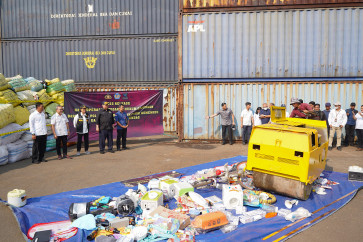Changing landscape of CSR in Asia Pacific
The business environment in Asia Pacific today is undergoing monumental change as corporations get to grips with the enormous need for them to behave responsibly
Change Size

T
he business environment in Asia Pacific today is undergoing monumental change as corporations get to grips with the enormous need for them to behave responsibly. As social and environmental challenges increase, governments, NGOs, consumers and employees are putting unprecedented pressure on corporations to behave responsibly.
In 2008, Edelman's multi-market research identified five major drivers that are reshaping stakeholder expectations and having an impact on corporate responsibility in the region:
1. Social and environmental channels
2. Government activism
3. Growing influence of NGOs
4. Internet and mobile communications
5. Passionate consumers and employees
6. Let's examine these more closely.
Social and environmental challenges
Asia Pacific's sustained and rapid economic growth has created pressures on the physical and social environment, in many cases to unprecedented levels. At the same time, vast numbers of people are still living below the poverty line. The trend toward urbanization with a growing number of workers moving to new mega-cities further aggravates the wealth gap, leading to greater social inequity and instability.
The social and environmental pressures are affecting companies in Asia in two ways. They are forcing companies to find more efficient means of consuming and using resources, and to better manage the social impact of their business, including taking care of employees and managing the social performance of suppliers.
These pressures are driving greater activism among influential stakeholders, who are now examining both financial and nonfinancial performance when assessing a company.
Government activism
Governments across the region are taking an increasingly active role in enforcing change in the corporate sector by enacting legislation on social and environmental performance. Companies must now take greater account of their social and environmental impact across all levels of the value chain, including that of their suppliers.
Today, increasing government interest and activism in the region is forcing companies to address their societal impact, whereas in the past this was done mostly on a voluntary basis.
Growing influence of NGOs
With the growth of communications channels, domestic and international NGOs are able to work together across borders on issues of mutual interest more efficiently than ever before. Larger NGOs are helping smaller local NGOs and community groups build capacity and increase their influence. Domestic NGOs monitoring corporate activity on the ground are now able to reach larger organizations, which can bring issues to light on the national and international stage.
This has a corresponding impact on the credibility of NGOs throughout the region. As issues such as environmental protection and corporate transparency assume greater importance within the public debate, government policymakers and NGOs are increasingly finding their interests more closely aligned.
This new NGO-government dynamic is creating stronger, more powerful NGO networks in the region and is an increasingly influential voice in support of more responsible business.
Web and mobile communications
Underlying - and magnifying - the impact of these trends is the proliferation of the Internet and mobile communications in Asia Pacific.
Since the debut of mobile phones, mobile technology and usage has continued to soar around the world. Over the next decade, Asia will become the largest regional mobile telecommunications market in the world, according to In-Stat, a leading researcher of digital communications trends.
As Internet use increases across the region, its influence as a credible source of information has grown tremendously. This has significant ramifications for companies in all areas of their activities, especially their corporate behavior. The global debate made possible by the Internet allows an expanding universe of stakeholders to scrutinize corporate activities to an unprecedented degree, while providing an important barometer of the issues that matter to them.
Passionate consumers and employees
The rise of the Internet and the increasing availability of information is empowering consumers and employees as never before, helping them become more vocal and more audible.
According to the Edelman 2009 Trust Barometer, consumers are more likely to trust a company that communicates frequently and honestly about the state of its business - including quality of products and services, and treatment of employees. Organizations that are transparent have the upper hand in sustaining consumer loyalty. *1*
Losing the trust of consumers can lead to one of three most-likely outcomes - they will criticize the company to people they know, actively demonstrate or protest against the company, or refuse to work for the company.
Companies can bring these passionate consumers closer to their business and engage them in mutual socially responsible activities, acting together to effect positive social change.
The way forward: tapping the new generation for the future
Companies have the priceless opportunity today to engage with a whole new generation of people who see corporate social responsibility as part of their identity, and a criterion for selection of potential employers. *2*
Employers who successfully manage to build their CSR efforts into the strategy of their business will profit from this new generation. Millennials grew up in an era when the Internet took off and social networks boomed, crafting a whole generation who not only actively communicate via web-based channels, but have also built strong networks online. The power of word-of-mouth marketing has never been more relevant than today, when anyone can be an advocate for a cause.
For Asia Pacific, CSR will continue to evolve. CSR goes beyond philanthropy - it is about building a sustainable business. Everything from supply chain management, employee rights, daily operations to consumption of raw materials should be mapped back to a company's commitment to CSR.
The writer is the chairman of IndoPacific Edelman in Jakarta.
Sources: *1* Edelman Trust Barometer 2009 *2* Working with Gen Y









